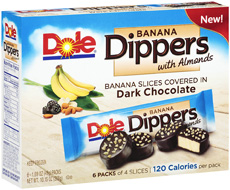PRODUCT: Dole Chocolate Banana Dippers
|
According to research conducted last month by Dole, more than half of American women have admitted to skipping a meal so they could enjoy a snack without feeling guilty.
With the introduction of Dole Banana Dippers, the company wants Americans to enjoy their meal and their sweet snack (not to mention the potassium and other nutrients in bananas). For only 120 calories or less per serving, you can savor a packet of plain Dole Banana Dippers or Banana Dippers Dark Chocolate with Almonds, both covered in antioxidant-rich dark chocolate. (Go for the almonds—see the nutritional information below.) |
Frozen bananas substitute for ice cream. Photo courtesy Dole. |
|
|
The individual packets contain 4 slices of fresh-frozen, chocolate-dipped banana that provide an ice cream-like experience, without the cholesterol or 15 calories of sugar in a half-cup of ice cream (the 1.55-ounce packet has 4g dietary fiber and 7g sugar). They have become a most popular snack at THE NIBBLE. Bananas are a terrific, heart-healthy food when included in a diet low in saturated fat and cholesterol. Naturally fat-, cholesterol- and sodium-free, bananas are a good source of potassium, dietary fiber, manganese and vitamins B6 and C. BANANA NUTRITION With 110 nutrient-dense calories per serving (126 grams, or one medium-sized banana) bananas are delicious and nutritious. Here are the nutrients in a banana†: |
||
 A box of Dole Banana Dippers with Almonds. Photo courtesy Dole. |
|
|
|
ALMOND NUTRITION Nuts are a good protein food. Yes, they have fats, but those are largely unsaturated, heart-healthy fats which have been shown to lower LDL cholesterol and the risk of heart disease. Here’s the scoop on the health benefits of nuts. A one-ounce serving of almonds (23 almonds) delivers: *Methodological Notes: The DOLE Banana Dippers survey was conducted by Wakefield Research among 1,000 nationally representative U.S. women ages 18+, between February 4 and February 7, 2013, using an email invitation and online survey. †Nutrient data provided by USDA’s National Nutrient Database. Almond information from Almond Board Of California.
|
||


